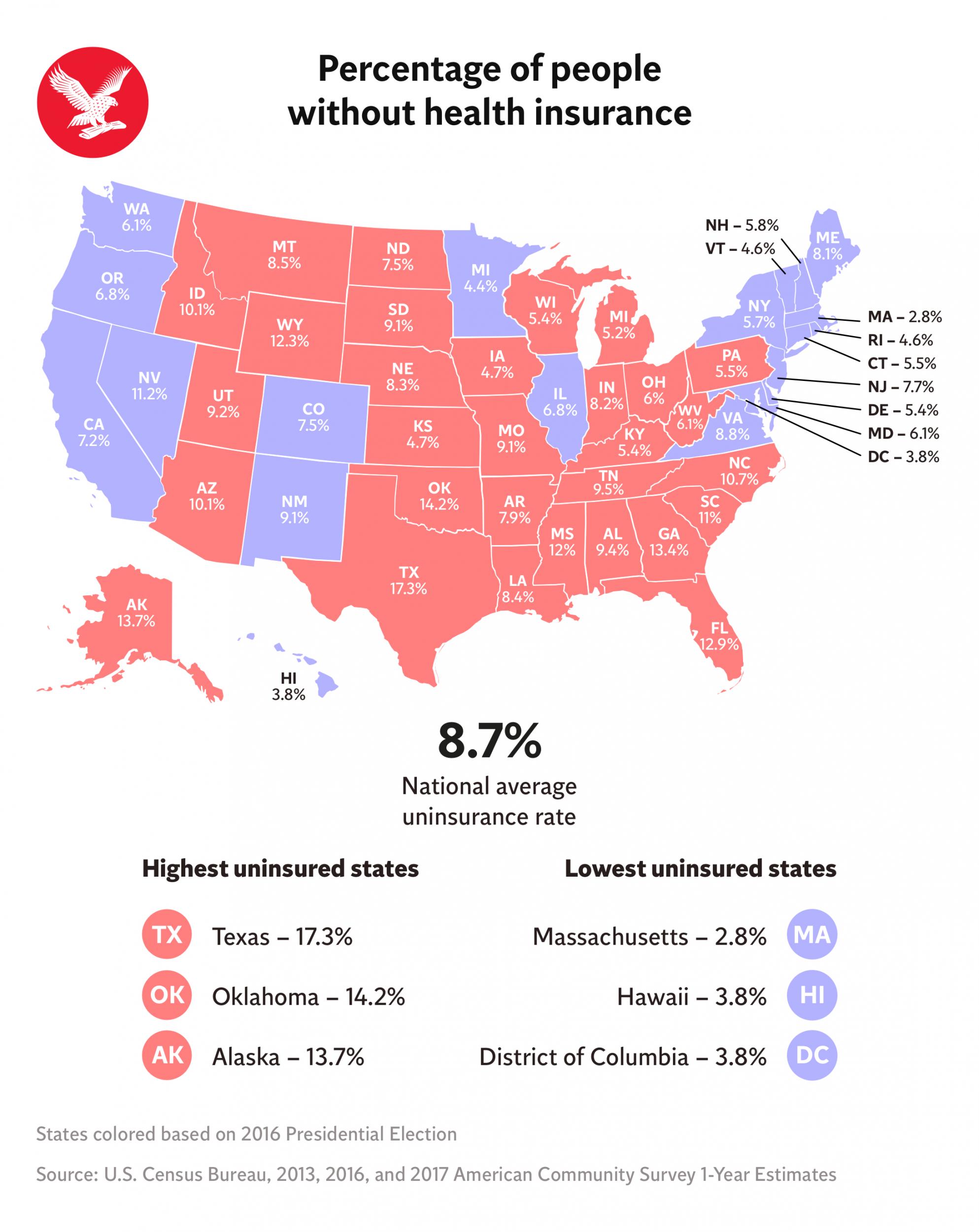The number of Americans with health insurance coverage has continued to steadily climb above 90 per cent since Barack Obama passed the Affordable Care Act in 2010. However, millions remain uninsured across the country, as Republican leadership seeks to dismantle the former president’s landmark legislative initiative.
The issue has found its way to the core of the upcoming 2018 midterm elections, with Democratic and Republican candidates offering vastly different solutions to combat the increasing costs of insurance and prescription drugs.
House and US Senate races in reliably red states have seen a historic opportunity for Democrats focusing on health care to gain new support among voters.

The national average of uninsured Americans in all 50 states currently stands at 8.7 per cent, with notable variations dependent on regions and sociopolitical factors.
Texas is the uninsured capital of the country, with over 17 per cent of residents lacking insurance according to recent US Census Bureau data.
Meanwhile, Republicans have maintained a majority of power in the state for decades — in fact, a Democrat has not been elected in statewide office since 1994.
El Paso Rep. Beto O’Rourke is hoping to change that come November, as he seeks to unseat Republican incumbent Ted Cruz in the Texas Senate race in which healthcare is a big issue.
“The overriding concern throughout Texas, big cities and small towns alike, Republicans and Democrats, is our ability to be well enough to do the things we’re intended to do in our lives,” he said at a recent rally.
His campaign has largely focused on expanding health care access and lowering costs for patients, a major concern among voters in the Lone Star state which has responded to the Democrat’s campaign with an unprecedented level of support for the region.
“I agree with a lot of his positions,” Haley Smith, a San Antonio resident, recently told The Independent at a rally for Mr O’Rourke. “My mom is a resident alien currently, so it’s a strong issue in my family. But I’m also really concerned about our state’s health care issue, as I’m a nurse, and it’s very, very important to me that all people can have access.”
Texas is followed by Oklahoma and Alaska as the second and third least insured states nationwide with 14.2 per cent and 13.7 per cent of residents lacking coverage respectively, according to the same data set.
Both states have regularly supported Republican leadership since at least the 1970s.
Democratic congressional candidate Kendra Horn has vowed to fight for health care access if elected in Arkansas, criticising the state’s lack of insurance during a recent debate against Republican incumbent Steve Russel in Oklahoma City.
“Simply put, I’m tired of watching Oklahoma be at the bottom and the top of all the wrong lists,” she said. “I believe we deserve representation that is going to listen to us, that will vote to invest in education, protect access to health care and bring the government back to the people.”
She added, “Fundamentally, health care to me is a right. It’s not a privilege. It’s a right because, at some point in time, each and every one of us is going to need medical care.”
Mr Russell responded by saying, “It’s not the government’s right to make your health care choices.” He then claimed the Affordable Care Act increased the cost of insurance for his employees by 250 per cent.
In Alaska, over 738,000 residents are insured through their employers or via government programs, while 30,000 receive coverage through a Medicaid expansion the Affordable Care Act allows.
But insurance prices have soared for the rest of Alaskans included in the state’s insurance exchange, as experts say insurers failed to sign up enough healthy residents in order to offset patients with costly conditions.
Alaska is also the fourth most expensive state for insurance in the US, where a knee replacement reportedly costs five times the amount as what it would in Seattle.
The state’s Senator Lisa Murkowski has supported Republican efforts to repeal the individual mandate component of the Affordable Care Act, writing in an Op-Ed last year, “I have always supported the freedom to choose.”
“I believe that the federal government should not force anyone to buy something they do not wish to buy, in order to avoid being taxed,” she wrote. “That is the fundamental reason why I opposed the Affordable Care Act from its inception and also why I cosponsored a bill to repeal the individual mandate tax penalty starting as early as 2013. And that is why I support the repeal of that tax today.”
Republicans failed to repeal and replace the former president’s health care initiative last year , a powerful rallying cry among the Republican party as it sought to gain control of both Houses in 2016.
With less than two weeks left until the historic November elections, it’s likely health care is one of the reasons voter rolls have greatly expanded by the millions in states like Texas, which broke records in 2018 after surpassing over 15m registered voters shortly after the primaries.







